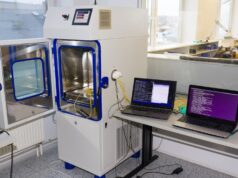
Data Science has evolved as a critical topic in today’s data-driven society. Because of the exponential expansion of data and the rising need for data-driven insights, the scope of occupations in Data Science is large and developing quickly. Organizations across a variety of industries, including healthcare, banking, e-commerce, and marketing, are using the potential of Data Science to achieve a competitive advantage.
Data Science:

The future of Data Science looks incredibly promising. As the world becomes more data-driven, the demand for skilled Data Scientists and professionals with expertise in Data Science will continue to grow. A Data Science Certification equips individuals with the necessary skills and knowledge to excel in various job roles within the field, including Data Scientist, Data Analyst, Machine Learning Engineer, and more.
Here are some key factors contributing to the future scope of Data Science:
The amount of data generated globally is expected to grow exponentially in the coming years. This includes structured and unstructured data from various sources such as social media, IoT devices, sensors, and more. Data Scientists will play a vital role in extracting insights from these massive datasets.
Artificial Intelligence and Machine Learning Advancement: Artificial intelligence and machine learning technologies are quickly advancing. As these technologies progress, the breadth of their use in real-world circumstances will broaden. Data Scientists will be at the cutting edge of designing and deploying new machine learning algorithms and models.
Companies of all sizes are recognizing the importance of data-driven decision-making. Healthcare, finance, retail, manufacturing, and marketing are among the industries that are increasingly depending on Data Science to achieve a competitive advantage. This pattern is projected to continue, resulting in an increase in demand for Data Science specialists.
Data Science intersects with other developing technologies such as blockchain, edge computing, and quantum computing. These technologies provide interesting opportunities for Data Scientists to explore and exploit their expertise in data analysis, security, and processing.
As privacy, security, and ethical data use become more of a concern, there is a rising demand for Data Scientists who can handle these problems. The future of data science will revolve around ethical data practises, algorithm fairness, and responsible data handling.
Computer Science:

Computer Science has a bright future ahead of it, thanks to technological breakthroughs and an increased reliance on digital solutions. Here are some significant aspects influencing computer science’s future scope:
Artificial intelligence, blockchain, quantum computing, and the Internet of Things (IoT) are all examples of emerging technologies. These technologies are predicted to revolutionize a variety of sectors and generate new work possibilities for computer scientists.
Software development will remain a prominent growth area in Computer Science. As automation becomes more common, there will be greater demand for competent software developers capable of designing, developing, and maintaining sophisticated systems and applications.
As the frequency and sophistication of cyber-attacks increase, so will the demand for cybersecurity personnel. Cybersecurity specialists in computer science will be critical in protecting digital assets, maintaining data privacy, and managing security threats.
As data grows at an exponential rate, the demand for individuals who can manage and analyze data will become critical. To extract insights from massive datasets, computer science specialists with experience in databases, data analytics, and data visualization will be in great demand.
The Internet of Things (IoT) is revolutionizing industries by linking devices, collecting data, and allowing automation. Professionals in computer science will be critical in building IoT systems, managing data generated by IoT devices, and assuring the security and effectiveness of IoT networks.
Computer science is rapidly crossing with other fields such as medicine, economics, and environmental sciences. Computer Science individuals that can effectively work with specialists from many fields would have a competitive advantage in the employment market.
Job Roles in Data Science

Data Scientists are in high demand as specialists in the field of data science. They have excellent analytical and problem-solving abilities, as well as expertise in statistical analysis, and machine learning, and programming. Data Scientists work on difficult data challenges, developing predictive models and extracting actionable insights to help them make better decisions. They work with cross-functional teams that include business stakeholders, technologists, and domain experts to find data patterns and trends that can lead to useful insights and solutions.
Data analysts are critical in studying and comprehending data. They gather, clean, and analyse data in order to identify patterns, trends, and correlations. Data analysts use statistical approaches and data visualization technologies to convey findings in a comprehensible way that aids decision-making. They are are critical in data exploration, hypothesis testing, and discovering crucial parameters that influence corporate success.
Machine Learning Engineers are pioneers in the development and deployment of machine learning models. Machine Learning Engineers build and implement algorithms that can learn from data and make accurate predictions as artificial intelligence advances. They focus on natural language processing, computer vision, recommendation systems, and anomaly detection, among other things. Data Scientists and Machine Learning Engineers work together to develop scalable and efficient algorithms with real-world applications.
Data Engineers are in charge of creating and managing the infrastructure needed for data storage, processing, and retrieval. They create data pipelines, put data governance systems in place, and assure data quality and integrity. Data Engineers collaborate with Data Scientists and other teams to ensure that data is easily accessible and available for analysis and decision-making.
Business Intelligence Analysts are responsible for obtaining useful insights from data to use in strategic decision-making. They generate reports, dashboards, and data visualizations to provide useful information to stakeholders in order to promote corporate growth and increase operational efficiency. Business Intelligence Analysts are critical in transforming data into actionable insights that directly affect an organization’s bottom line.
Data architects are in charge of creating and implementing data structures and systems. They work with stakeholders to identify data needs, maintain data quality and security, and develop scalable data models. Data architects are critical in the development of strong and efficient data infrastructures that enable the storage, processing, and analysis of huge amounts of data.
Conclusion:

Across sectors, software developers are in high demand. They create, build, and support software products that are tailored to the demands of organizations and end customers. Software developers have great programming abilities as well as knowledge of several programming languages and frameworks. They code, test, and debug, and frequently cooperate with cross-functional teams to produce new solutions.
Systems analysts are critical in the analysis and evaluation of organizational processes and needs. They collaborate with stakeholders to understand their requirements and develop IT solutions that increase operational efficiency and effectiveness. Systems analysts serve as liaisons between technical teams and end users, ensuring that systems fulfill user requirements as well as organizational objectives.
Network administrators are in charge of overseeing and maintaining computer networks. They set up network devices, monitor network performance, solve connectivity difficulties, and make sure the network is secure and reliable. Network administrators are critical to the proper operation of an organization’s IT infrastructure.









